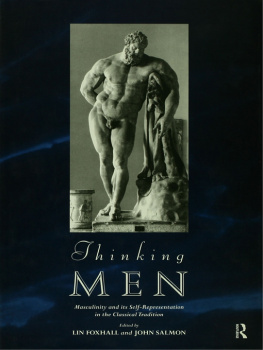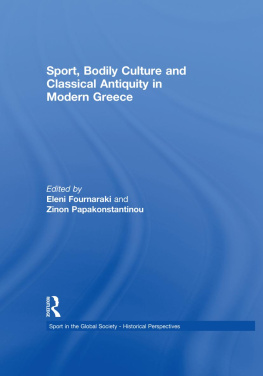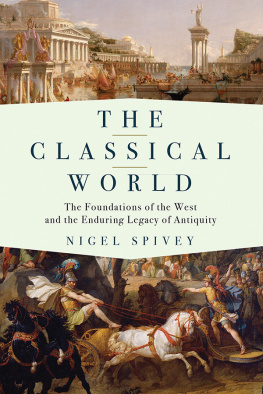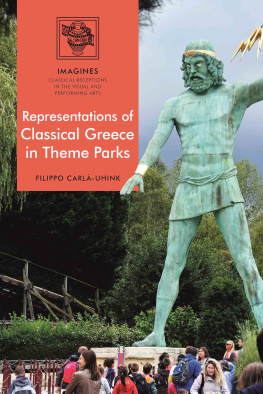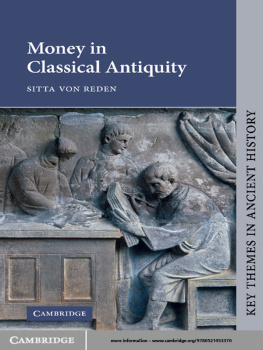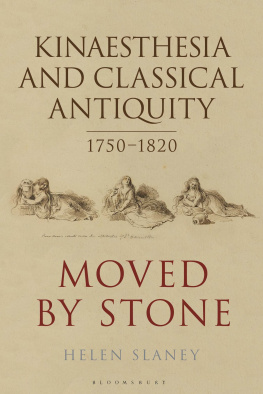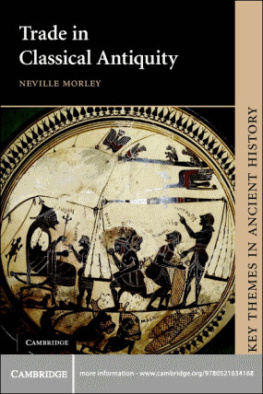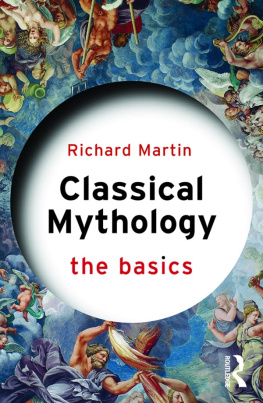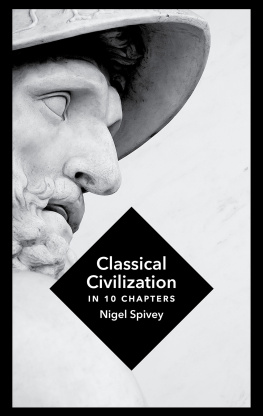Leicester-Nottingham Studies in Ancient Society
Volume 7
THINKING MEN
THINKING MEN
Masculinity and its Self-Representation
in the Classical Tradition
Edited by
LIN FOXHALL and JOHN SALMON
Every effort has been made to obtain permission to quote from the copyright
works reproduced in this book
First published 1998
by Routledge
11 New Fetter Lane, London EC4P 4EE
Simultaneously published in the USA and Canada
by Routledge
29 West 35th Street, New York, NY 10001
1998 selection and editorial matter Lin Foxhall and John Salmon;
individual chapters, the contributors
The right of Lin Foxhall and John Salmon to be identified as the Authors
of this Work has been asserted by them in accordance with the Copyright,
Designs and Patents Act 1988
Typeset in Times by Florencetype Ltd, Stoodleigh, Devon
Printed and bound in Great Britain by
Biddies Ltd, Guildford and Kings Lynn
All rights reserved. No part of this book may be reprinted or reproduced or
utilised in any form or by any electronic, mechanical, or other means, now
known or hereafter invented, including photocopying and recording, or in
any information storage or retrieval system, without permission in writing
from the publishers.
British Library Cataloguing in Publication Data
A catalogue record for this book is available from the British Library
Library of Congress Cataloguing in Publication Data
Thinking men: masculinity and its self-representation in the
classical tradition / edited by Lin Foxhall and John Salmon.
p. cm. -(Leicester-Nottingham studies in ancient society; v. 7)
1. Classical literature-Men authors-History and criticism.
2. Literature and society-Greece. 3. Literature and society-Rome. 4. Selfknowledge
in literature. 5. Masculinity in literature.
6. Civilization, Classical. 7. Masculinity in art. 8. Men in literature. 9. Arts,
Classical. 10. Men in art. 11. Men Greece.
12. Men-Rome. I. Salmon, J. B. II. Title. III. Series.
PA3009.F69 1998-02-24 880' .09 dc21 97-51499
CIP
ISBN 0-415-14635-6
Contents
| LIN FOXHALL |
| MATTHEW FOX |
| ROBIN OSBORNE |
| EMMA J. STAFFORD |
| LIN FOXHALL |
| MARGARET WILLIAMSON |
| RICHARD HAWLEY |
| ALAN H. SOMMERSTEIN |
| ANGELA HEAP |
| KAREN F. PIERCE |
| JONATHAN WALTERS |
| MARY HARLOW |
| GILLIAN CLARK |
| FELICITY ROSSLYN |
Plates
Contributors
Gillian Clark is Senior Lecturer in Classics at the University of Liverpool. She has published extensively on late antique social and intellectual history, with special reference to the history of gender. She is co-editor of the Oxford Early Christian Studies series and of the Translated Texts for Historians series.
Matthew Fox lectures in Classics at the University of Birmingham. He studied in Oxford and Berlin, and is the author of Roman Historical Myths (Oxford 1996). He is currently working on the hermeneutics of ancient historiography.
Lin Foxhall, Reader in the School of Archaeological Studies, University of Leicester, has co-edited Greek Law in its Political Setting (Oxford 1996), and has written extensively on both gender and the agricultural economy. Her book on olive cultivation in ancient Greece is in press.
Mary Harlow is Lecturer in Ancient History at the University of Birmingham. She recently completed a Ph.D. thesis on motherhood in Late Antiquity.
Richard Hawley is Lecturer in Classics at Royal Holloway College, University of London, and co-editor of Women in Antiquity: New Assessments (Routledge 1995).
Angela Heap lives near Cambridge and has recently completed an M.Phil. thesis on Menander. From 1989-93 she was Librarian and Fellow of New Hall, Cambridge.
Robin Osborne is Professor of Ancient History at the University of Oxford and Fellow and Tutor at Corpus Christi College. His publications range widely over Greek history and archaeology and include Greece in the Making 1200-479 BC (Routledge 1996). His Archaic and Classical Greek Art has just appeared in the new Oxford History of Art series.
Karen F. Pierce is a postgraduate student at Lampeter College, University of Wales, researching Helen of Troy. She is co-editor of Rape in Antiquity: Sexual Violence in the Greek and Roman Worlds (Duckworth 1997).
Felicity Rosslyn is Senior Lecturer in the University of Leicesters English Department, where she teaches tragic drama. She edits The Cambridge
Quarterly and her forthcoming book is on thematic continuities in tragedy from Aeschylus to Lorca.
John Salmon is Senior Lecturer in Ancient History at the University of Nottingham and co-editor of Human Landscapes in Classical Antiquity: Environment and Culture (Routledge 1996).
Alan H. Sommerstein is Professor of Greek at the University of Nottingham. He has edited Aeschylus Eumenides (Cambridge 1989) and nine of Aristophanes comedies, and is the author of Aeschylean Tragedy (Bari 1996) and of many articles on Greek tragedy and comedy.
Emma J. Stafford , Lecturer in Classics at Lampeter College, University of Wales, is currently writing a book on the phenomenon of the worship of abstract ideas in personified form in ancient Greece, as well as collaborating with colleagues on a source-book on Greek religion (Routledge).
Jonathan Walters gained his Ph.D. at Cambridge University with a thesis on Ancient Roman Concepts of Manhood after a varied non-academic career. He has lectured at Bristol University and Trinity College Dublin and was Mellon Fellow at the University of Southern California, Los Angeles (1997-8).
Margaret Williamson is Senior Lecturer in Classical Studies at St Marys University College, University of Surrey. She is the author of Sapphos Immortal Daughters (Harvard University Press 1995) and co-editor of The Sacred and the Feminine in Ancient Greece (Routledge 1997).
Preface
Such sunny days for the study of gender! After long years of feminist labour in the vineyards of womens studies, scholars such as Joan Wallach Scott have seen their call for the use of gender as a category of historical analysis heeded (Scott 1988). The exploration of the unmarked term, masculinity, has begun and is taking the form not of self-indulgent or self-congratulatory replication of traditional scholarship with a dollop of mens studies rhetoric, but of self-aware and consciously theorised efforts to understand the relational nature of gender. In the volumes of the Leicester-Nottingham Ancient History Seminars, we arc seeing the product of that effort in a most interesting and sophisticated collection of essays.
Getting to this point has taken some time, and not simply because men were scholarships unmarked term, that which could go without saying. The old and irritating conversation between the feminist and her male colleague reads as follows: he says, well, if were going to have womens studies, why not have mens studies too ha ha ha! She says, isnt everything in this university already just that? Such conversations may gradually be silenced for reasons that go beyond the fear of some political incorrectness. From work on women by feminists and others to the growing interest in the study of sexuality that came on the heels of Foucault to a rising consciousness of the fact that no social system can be comprehensible only through its marked terms, we now seem to have arrived at a point where gender is being talked about within the framework of a highly sophisticated set of theories of social and cultural representation. Such theories form the foundation for the chapters in this book, as in their general concern to understand the limits of their own attempts to locate and concretise an impossibly complete masculinity, an ultimately unrepresentable, complete and unified Greek or Roman male subject.

